
"Unchained Melody" is a 1955 song with music by Alex North and lyrics by Hy Zaret. North wrote the music as a theme for the prison film Unchained (1955), hence the song title. Todd Duncan sang the vocals for the film soundtrack. It has since become a standard and one of the most recorded songs of the 20th century, most notably by the Righteous Brothers in 1965. According to the song's publishing administrator, over 1,500 recordings of "Unchained Melody" have been made by more than 670 artists, in multiple languages.

"Baby Love" is a song by American music group the Supremes from their second studio album, Where Did Our Love Go. It was written and produced by Motown's main production team Holland–Dozier–Holland and was released on September 17, 1964.

"Come See About Me" is a 1964 song recorded by the Supremes for the Motown label. The track opens with a fade-in, marking one of the first times the technique had been used on a studio recording.
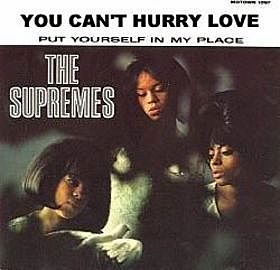
"You Can't Hurry Love" is a 1966 song originally recorded by the Supremes on the Motown label. It was released on July 25 of 1966 as the second single from their studio album The Supremes A' Go-Go (1966).

"My Girl" is a soul music song recorded by the Temptations for the Gordy (Motown) record label. Written and produced by the Miracles members Smokey Robinson and Ronald White, it became the Temptations' first U.S. number 1 single, and is currently their signature song. Robinson's inspiration for writing "My Girl" was his wife, Miracles member Claudette Rogers Robinson. The song was included on the Temptations 1965 album The Temptations Sing Smokey. In 2017, the song was selected for preservation in the National Recording Registry by the Library of Congress as being "culturally, historically, or artistically significant".
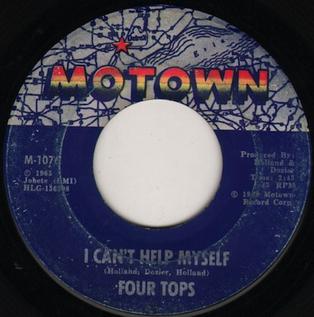
"I Can't Help Myself " is a 1965 hit song recorded by the Four Tops for the Motown label.

"Hold Me, Thrill Me, Kiss Me" is a song written by Harry Noble and originally performed by Karen Chandler in 1952. It has been re-recorded several times since then, the most notable covers being by Mel Carter in 1965 and Gloria Estefan in 1994.

"I Can't Stop Loving You" is a popular song written and composed by country singer, songwriter, and musician Don Gibson, who first recorded it on December 3, 1957, for RCA Victor Records. It was released in 1958 as the B-side of "Oh, Lonesome Me", becoming a double-sided country hit single. At the time of Gibson's death in 2003, the song had been recorded by more than 700 artists, most notably by Ray Charles, whose recording reached No. 1 on the Billboard chart.

"Red Roses for a Blue Lady" is a 1948 popular song by Sid Tepper and Roy C. Bennett. It has been recorded by a number of performers. Actor-singer John Laurenz (1909–1958) was the first to record the song for Mercury Records. It rose to #2 on the weekly “Your Hit Parade” radio survey in the spring of 1949. The original 78rpm single was issued on Mercury 5201 - Red Roses For A Blue Lady by John Laurenz.
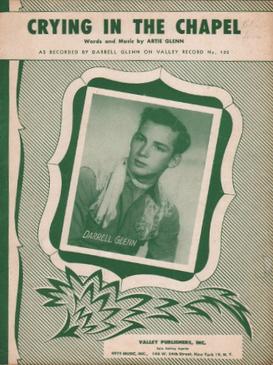
"Crying in the Chapel" is a song written by Artie Glenn and recorded by his son Darrell Glenn. The song was released in 1953 and reached number six on the Billboard chart.
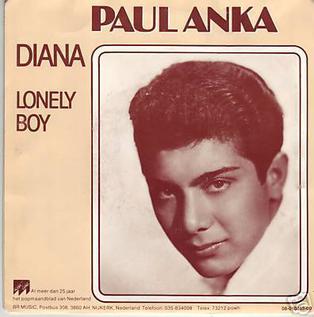
"Diana" is a song written and first performed by Paul Anka, who recorded it in May 1957 at Don Costa’s studio in New York City. Anka stated in his autobiography that the song was inspired by a girl named Diana Ayoub, whom he had met at his church and community events, and had developed a crush on. Session musicians on the record included George Barnes (musician) playing lead guitar, Bucky Pizzarelli playing the "Calypso" riff on guitar, Irving Wexler on piano, Jerry Bruno on bass, and Panama Francis on drums. The song was recorded in May 1957 at RCA Studios in New York. Backup singers included Artie Ripp.
"Young Love" is a popular song, written by Ric Cartey and Carole Joyner, and published in 1956. The original version was recorded by Ric Cartey with the Jiva-Tones on November 24, 1956. It was released in 1956 by Stars Records as catalog number 539 and one month later by RCA Records as catalog number 47-6751. Cartey's version never charted.
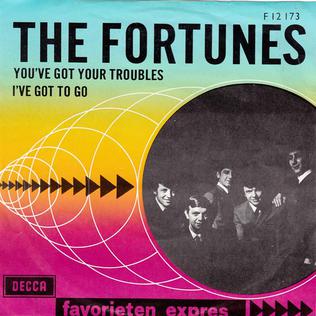
"You've Got Your Troubles" became the inaugural composition by the prolific songwriting team of Roger Cook and Roger Greenaway in 1964. "You've Got Your Troubles" became a number 2 UK hit for the Fortunes in the United Kingdom in August 1965, affording the group international success including a Top Ten ranking in the US. The track was included on the Fortunes' self-titled 1965 debut album release, the group's only album release of the 1960s.
"You're Nobody till Somebody Loves You" is a popular song written by Russ Morgan, Larry Stock, and James Cavanaugh and published in 1944. The song was first recorded by Morgan and was a hit for him in 1946, reaching the No. 14 spot in the charts. The best known version was Dean Martin's, which was released in 1960 and reissued in 1964.

"King of the Road" is a song written by country singer Roger Miller, who first recorded it in November 1964. The lyrics tell of the day-to-day life of a hobo who, despite having little money, revels in his freedom, describing himself humorously and cynically as the "king of the road". It was Miller's fifth single for Smash Records.
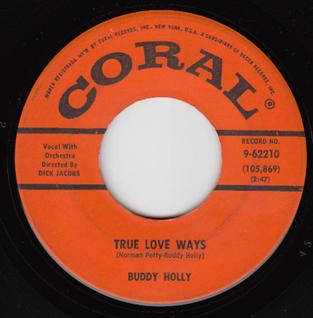
"True Love Ways" is a song attributed to Norman Petty and Buddy Holly. Buddy Holly's original was recorded with the Dick Jacobs Orchestra in October 1958, four months before the singer's death. It was first released on the posthumous album The Buddy Holly Story, Vol. 2, in March 1960. The song was first released as a single in Britain in May 1960, reaching number 25 on the UK Singles Chart. It was released the following month in the US, but did not make the charts. In 1988, a UK re-release of the recording by MCA, the single reached no. 65 on the UK singles chart in a 5 week chart run.

"Silhouettes" is a song made famous by the doo-wop group the Rays in 1957. A competing version by the Diamonds was also successful. In 1965 it was a number 5 hit in the US for Herman's Hermits, and in 1990 it was a number 10 hit in the UK for Cliff Richard.
"I Will" is a song written by Dick Glasser.














